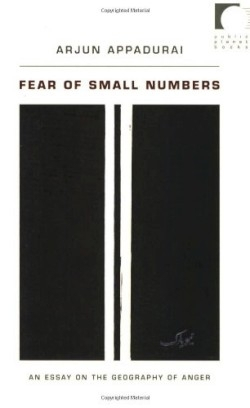Fear of Small Numbers
An Essay on the Geography of Anger
Globalization’s promises of open markets, large sums of financial capital, and enlightened constitutional rule have deteriorated into all-too-frequent nightmarish scenarios of insurmountable economic inequality within and between nations, inflamed hatred of the United States, terrorist attacks on civilians, and genocidal ethnic cleansing. The author of these brief, penetrating essays investigates globalization’s dark side and, most significantly, demonstrates that “small number” minorities have become both victimized and victimizer.
Appadurai is Provost and Senior Vice President for Academic Affairs at the New School, its John Dewey Professor of Social Science, and the author of Modernity at Large: Cultural Dimensions of Globalization and Globalization, the co-founder of Public Culture journal, and the co-founder and co-director of Interdisciplinary Network on Globalization.
The Al-Qaeda 9/11 terrorist attacks were not only acts of war against the United States but also, as the author claims, attacks against the integrity of nation-states as political entities. Al-Qaeda demonstrated how small numbers of terrorists could quickly alter international relations. Modern terrorists have formed “cellular” structures and organizations that use new information technologies to gain trans-nation support: “small number” cells have taken advantage of globalization’s flaws to recruit members and sympathizers to causes that transcend national boundaries. The perpetrators of the 2005 London bombings were an undereducated and undervalued small number of youth who identified with international terrorists and not with Great Britain’s third world minorities. In this instance the oppressed became the aggressors.
An interesting case presented here shows that the conservative Indian Hindu Party, in its attempt to marginalize India’s Muslim minority, portrays it as conspirators in a Pakistani movement to destroy India. The author also explains that the United States has encountered its own “fear of small numbers” in Iraq, where minority coalitions continue to kill American troops, in contradiction to the Bush administration’s prediction that U.S. forces would be welcomed as liberators.
As Appadurai concludes, the world is full of Sikhs, Basques, Kurds, and other angry minorities, who as potential victims of ethnic cleansing themselves, are prepared to create or join existing terrorists cells. Yet, the author ends with a cautiously optimistic appraisal of a growing number of beneficial cellular organizations that promote human rights and ecological balance—Greenpeace and Doctors Without Borders among them. Ultimately, this thought-provoking investigation warns that the balance of civilization might be determined by which set of “small number” groups—the progressive or the terrorist—prevail.
Disclosure: This article is not an endorsement, but a review. The publisher of this book provided free copies of the book to have their book reviewed by a professional reviewer. No fee was paid by the publisher for this review. Foreword Reviews only recommends books that we love. Foreword Magazine, Inc. is disclosing this in accordance with the Federal Trade Commission’s 16 CFR, Part 255.


